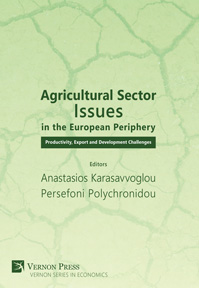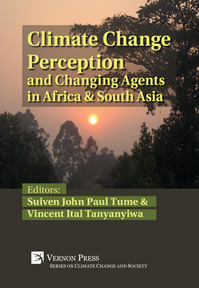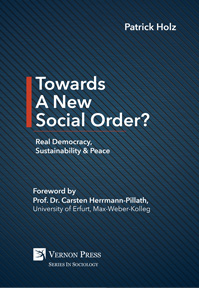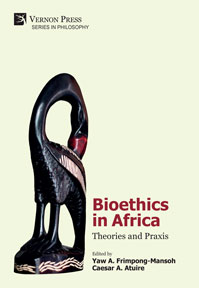Climate Change and Sub-Saharan Africa: The Vulnerability and Adaptation of Food Supply Chain Actors
John K. M. Kuwornu (Ed.)
by Abdulrazak Karriem , Sampson Osei , Yaw Bonsu Osei-Asare , Suhiyini Issah Alhassan , Suiven John Paul Tume (Green Care Association, Cameroon), Mbu Dora Nyuykighan , Moye Eric Kongnso (University of Dschang, Cameroon), Bankui Andrew Dzeaye , Mairong Frederick Nsaikii , Njodzeka Gilbert Njodzeka (Green Care Association, Cameroon), Ali Essossinam , John K. M. Kuwornu (Asian Institute of Technology, Thailand), Avishek Datta , Armah Ralph Nii Armah , Ramatu M. Al-Hassan , Mustapha Abubakar Sadiq , Mohammed Tiyumtaba Shaibu , Franklin Kodzo Avornyo , Elaine Tweneboah Lawson , Adelina Mensah , Christopher Gordon , Joseph Amikuzuno , Damba, T. Osman , Derick T. Adu
Purchase this book
(click here to change currency)
The adverse effects of climate change and climate variability have become some of the biggest environmental and socio-economic challenges for society, and for food supply chain actors, in particular. Serving as a serious inhibitor to the attainment of food security, climate change poses a fundamental threat to the availability, accessibility, stability and utilization of nutritious food and quality drinking water. The threat of this global phenomenon is not only apparent from the difficulties faced by all food supply chain actors, but is also felt acutely by households dependent on semi-subsistence agriculture. As evidenced by numerous studies conducted by the academic community, governmental and non-governmental organisations, climate change and climate variability will have disastrous effects on entire food supply chains across the world.
This edited volume looks to address: How vulnerable are food supply chain actors to climate change and climatic variability? What adaptation strategies are they adopting? How is the resilience of food supply chains being supported? Are they being financed and/or supported by international organizations to cope with climate change? And what governmental support are they receiving to help cope with climate change?
This book is an essential resource for students, lecturers, researchers, agribusinesses, marketing firms, agricultural institutions, climate change adaptation institutions, policymakers and many others with an interest in agricultural development and the global food industry.
INTRODUCTION
LIST OF FIGURES
LIST OF TABLES
LIST OF ABBREVIATIONS
LIST OF CONTRIBUTORS
FOREWORD BY SURESH BABU
FOREWORD BY VENKATACHALAM ANBUMOZHI
FOREWORD BY JOYASHREE ROY
PREFACE
ACKNOWLEDGEMENTS
CHAPTER 1 The Policy environment of climate change adaptation
Derick T. Adu and John K.M. Kuwornu
CHAPTER 2 Assessing the vulnerability of smallholder women rice farmers to climate variability in the Northern Region of Ghana: The livelihood vulnerability index approach
Suhiyini Issah Alhassan, Yaw Bonsu Osei-Asare, John K.M. Kuwornu
CHAPTER 3 Food crop vulnerability to climate variability and change at the household level in Bui Division, Northwest Cameroon
Suiven John Paul Tume, Mbu Dora Nyuykighan, Moye Eric Kongnso, Bankui Andrew Dzeaye, Mairong Frederick Nsaikii, Njodzeka Gilbert Njodzeka
CHAPTER 4 Perceptions of climate change, traditional beliefs and determinants of farm households’ adaptation decisions in Northern Togo
Ali Essossinam
CHAPTER 5 Social capital and climate change adaptation among smallholder farmers in the Central Region of Ghana
Sampson Osei and Abdulrazak Karriem
CHAPTER 6 What factors influence farmers’ vulnerability to climate change and variability? Empirical evidence from smallholder women rice farmers in the Northern Region of Ghana
Suhiyini Issah Alhassan, Yaw Bonsu Osei-Asare, John K.M. Kuwornu
CHAPTER 7 Impacts of participation in climate change projects on Ghanaian maize farmers’ yields, income and resilience to climate shocks
Armah Ralph Nii Armah, Ramatu M. Al-Hassan, John K. M. Kuwornu
CHAPTER 8 Vulnerability of smallholder maize farming households to climate variability in the Eastern Region of Ghana
Mustapha Abubakar Sadiq, Ramatu M. Al-Hassan, John K. M. Kuwornu
CHAPTER 9 A multinomial logit analysis of farmers’ adoption of climate variability adaptation strategies: The case of smallholder women rice farmers in the Northern Region of Ghana
Suhiyini Issah Alhassan, John K.M. Kuwornu, Yaw Bonsu Osei-Asare
CHAPTER 10 Perceptions and determinants of the adoption of indigenous strategies for adaptation to climate change: Evidence from smallholder livestock farmers in North-West Ghana
Mohammed Tiyumtaba Shaibu, Suhiyini Issah Alhassan, Franklin Kodzo Avornyo, Elaine Tweneboah Lawson, Adelina Mensah, Christopher Gordon
CHAPTER 11 Gender-based climate change impacts and adaptation strategies among smallholder farmers in Northern Ghana – What lessons for nationally appropriate mitigation actions exist?
Joseph Amikuzuno, John K. M. Kuwornu, Damba, T. Osman
CHAPTER 12 Smallholder maize farmers’ constraints to climate change adaptation strategies in the Brong-Ahafo Region of Ghana
Derick T. Adu, John K. M. Kuwornu, Avishek Datta
CHAPTER 13 General discussion on the vulnerability and adaptation of food supply chain actors to climate change
John K. M. Kuwornu and Derick T. Adu
CHAPTER 14 Conclusions and recommendations
John K. M. Kuwornu
INDEX
John K. M. Kuwornu holds a PhD in Agricultural Economics and Marketing from Wageningen University, Netherlands. He is currently an Associate Professor of Agribusiness Management Field of Study at the School of Environment, Resources and Development, Asian Institute of Technology, Thailand. His areas of teaching and research include: Agribusiness Management, Agricultural Marketing and Trade, Agricultural Development, Agricultural Policy, Marketing Channels, Consumer Behaviour, Supply Chain Management, Commodity Futures Markets, Econometrics, Quantitative Methods, Climate Change, Food Security, Agrobiodiversity and Stock Markets.
Climate Change, Sub-Saharan Africa, Vulnerability, Adaptation, Food Supply Chains, Governments
See also
Bibliographic Information
Book Title
Climate Change and Sub-Saharan Africa: The Vulnerability and Adaptation of Food Supply Chain Actors
ISBN
978-1-62273-265-4
Edition
1st
Number of pages
382
Physical size
236mmx160mm

![Climate Change and Sub-Saharan Africa: The Vulnerability and Adaptation of Food Supply Chain Actors [Hardback]](/file/7498/72e852918b41fa9f6e7db369e8aeef13/1543484894.jpg)






